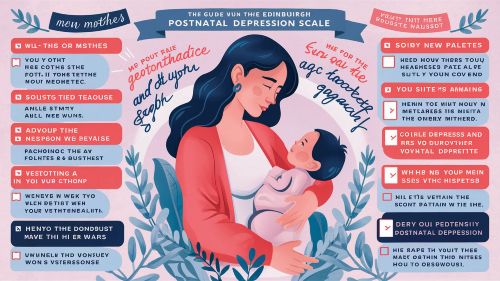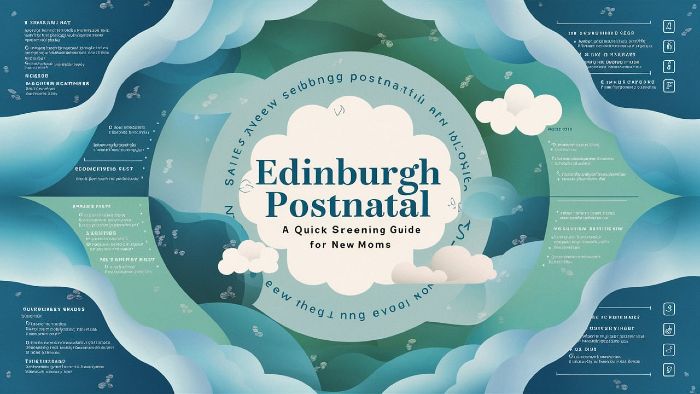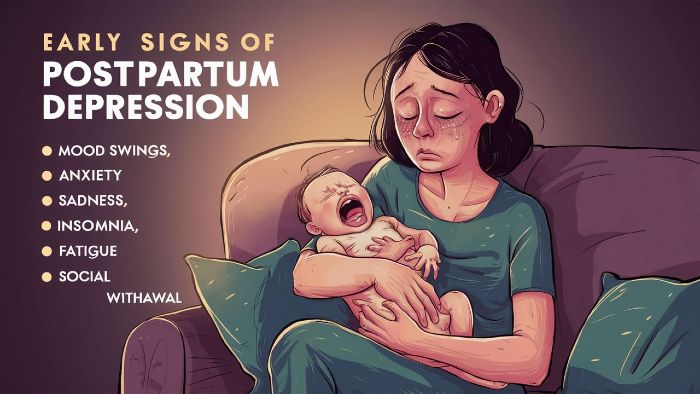In the hazy, sleep-deprived first few weeks of motherhood, your emotions are a tangled knot. There’s love, for sure. But there’s also exhaustion, overwhelm, and maybe even a deep, unsettling sadness that you feel too guilty to name.
Friends and family might tell you, “It’s just the baby blues. It’ll pass.” And for many, it does. But sometimes, there’s a persistent whisper beneath the chaos, a quiet but insistent feeling that something is truly wrong.
Ignoring that whisper is a risk you don’t have to take.
Recognizing the early signs of postpartum depression (PPD) is one of the most powerful things you can do for yourself and your family. Early intervention can significantly shorten the duration of the illness, lessen its severity, and help you find your way back to yourself faster.
This guide is here to help you listen to those whispers. These are 10 of the most common early signs of PPD that you should never ignore.
The Golden Rule: Understanding the Two-Week Mark
First, let’s draw a clear line in the sand. The “baby blues” are real, but they have an expiration date.
- The Baby Blues: A period of mood swings, weepiness, and anxiety that starts a few days after birth and resolves on its own within two weeks. It’s caused by a massive hormonal crash and sleep deprivation.
- Postpartum Depression (PPD): A clinical mood disorder whose symptoms persist for longer than two weeks. It does not typically resolve on its own and often worsens without treatment.
Key Takeaway: If your “blues” haven’t started to lift after two weeks, or if your symptoms are getting worse, it’s time to stop calling them the baby blues and start considering that it could be PPD.
10 Early Signs of PPD You Shouldn’t Ignore
1. The Joy Feels Forced or Is Completely Absent (Anhedonia)
You look at your beautiful baby, and you know you should feel a rush of blissful love. But instead, you feel… nothing. A hollow emptiness. Or maybe you can put on a happy face for visitors, but the moment they leave, the mask drops and you feel a profound numbness.
- What it feels like: A disconnect. It’s like watching your life in black and white when everyone else sees it in color.
- Why it’s an early sign: This loss of pleasure, known as anhedonia, is a hallmark symptom of clinical depression. It’s more than just being tired; it’s a fundamental change in your brain’s ability to experience joy.
2. Your “Worry” Feels More Like “Terror”
All new parents worry. But postpartum anxiety, which often accompanies PPD, is different.
- What it feels like: Your mind is hijacked by racing, intrusive, and often terrifying “what if” thoughts. You can’t turn off the loop of worst-case scenarios about your baby’s health and safety. This constant state of high alert can lead to physical symptoms like a racing heart, dizziness, or nausea.
- Why it’s an early sign: When worry becomes constant, irrational, and starts to interfere with your ability to function (e.g., you can’t sleep for fear the baby will stop breathing), it has crossed the line from normal concern into a clinical symptom.
3. You Feel Rage and Irritability Over Everything

Are you snapping at your partner for breathing too loudly? Do you feel a surge of white-hot anger when the baby spits up on a clean outfit? This is often called “postpartum rage.”
- What it feels like: You have a hair-trigger temper. You feel constantly on edge, and your frustration tolerance is zero. These angry outbursts are often followed by intense waves of guilt and shame.
- Why it’s an early sign: This extreme irritability is not a character flaw. It’s a sign that your nervous system is completely overloaded by the hormonal and emotional stress of PPD. For many women, anger is the primary “face” their depression wears.
4. You Feel Deeply Guilty and Ashamed
Your inner critic has taken over, and it is relentlessly cruel.
- What it feels like: You are convinced you are a bad mother. You feel guilty for everything: for needing a break, for not enjoying every moment, for your negative feelings. You feel a deep sense of shame, as if you are uniquely failing at something that should be natural.
- Why it’s an early sign: A healthy parent might feel guilty about a specific action (“I wish I hadn’t lost my patience”). PPD makes you feel guilty about your very existence as a mother (“I am a bad mom”). This pervasive guilt is a cognitive distortion fueled by depression.
5. You Are Withdrawing from Everyone
The thought of making conversation or seeing a friend feels utterly exhausting.
- What it feels like: You want to be alone. You ignore texts, make excuses to avoid visitors, and pull away from your partner. It’s not because you don’t love them; it’s because the effort of “performing” normalcy is too much to bear.
- Why it’s an early sign: Social withdrawal is a classic behavioral symptom of depression. PPD thrives in isolation, and this retreat, while it feels protective, actually makes the illness stronger.
6. You Can’t Sleep, Even When the Baby Is Asleep
This is one of the most telling signs. “Sleep when the baby sleeps” is impossible advice when your own brain won’t let you.
- What it feels like: You are bone-tired, but the moment your head hits the pillow, your mind starts racing with anxious thoughts. Or you wake up at 3 a.m. with your heart pounding and can’t get back to sleep.
- Why it’s an early sign: This kind of insomnia is not just about being disturbed by a baby’s cries. It’s a sign of a dysregulated nervous system and a hallmark of both depression and anxiety.
7. You Feel Disconnected from Your Baby
This is one of the most painful and shameful symptoms to admit, but it is incredibly common.
- What it feels like: You are going through the motions of care—feeding, changing, bathing—but you feel no emotional connection. You may feel like a babysitter, or even feel resentment toward this tiny person who has upended your life.
- Why it’s an early sign: PPD can create an invisible wall, blocking the hormones and emotional pathways that facilitate bonding. It is a direct symptom of the illness, NOT a reflection of your love.
8. You Have Scary, Unwanted Thoughts
You might have a sudden, horrific, and unwanted thought or mental image flash into your mind—often of something bad happening to the baby.
- What it feels like: These thoughts are terrifying, intrusive, and the exact opposite of what you want. You are horrified and disgusted by them, which makes you think you are a monster.
- Why it’s an early sign: These are called intrusive thoughts and are a classic symptom of postpartum anxiety and OCD. The fact that you are horrified by them is the key: it shows you are not psychotic and have no desire to act on them. It is crucial to tell a therapist about these thoughts, as they are very treatable.
9. You Feel Physically Unwell
Depression is not just “in your head.” It lives in your body.
- What it feels like: You may have constant headaches, stomach problems, unexplained aches and pains, or a racing heart. You might feel dizzy or have no appetite.
- Why it’s an early sign: Chronic stress and anxiety flood your body with hormones like cortisol and adrenaline, which can cause a wide range of physical symptoms. If you’ve been medically cleared by your doctor but still feel physically “off,” it could be your body sounding the alarm for your mental health.
10. You Fantasize About Escaping
You find yourself daydreaming about running away, getting in your car and just driving, or getting sick so you can go to a hospital and be cared for.
- What it feels like: A desperate longing to escape the immense pressure of your current reality.
- Why it’s an early sign: These “escape fantasies” are a coping mechanism. They are a sign that you feel completely trapped and overwhelmed. While they may seem harmless, they can be a precursor to more serious thoughts of self-harm if the underlying depression is not addressed.
RED FLAG SYMPTOM: When to Seek Immediate Help
If your “escape fantasies” become more specific and turn into thoughts of actually harming yourself, this is a medical emergency.
What to Do RIGHT NOW:
- Call or text the 988 Suicide & Crisis Lifeline.
- Go to the nearest hospital emergency room.
- Call 911.
- Tell someone you trust that you are not safe and need help immediately.
Your life is valuable. These thoughts are a symptom of a treatable illness.
[This section MUST be visually distinct. Use a “Cover” block with a red or bright yellow background, large font, and bold text.]
Why Ignoring These Early Signs Is a Risk
You might be tempted to “wait it out” or “push through,” telling yourself it will get better. But untreated PPD often gets worse, not better.
- It can last longer. Early intervention is proven to shorten the duration of the illness.
- It can become more severe. Mild symptoms can escalate into a major depressive episode.
- It can impact your bond with your baby and your relationship with your partner.
- It robs you of the joy you deserve to feel in your baby’s first year.
What to Do If You Recognize These Signs
- Talk to someone. Choose one safe person—your partner, your best friend, your mother—and be honest. Say, “I’m struggling more than I’m letting on.”
- Use a Screening Tool. Take the Edinburgh Postnatal Depression Scale (EPDS) online. It’s a 10-question tool that can help you quantify your feelings.
- Call Your Doctor. Make an appointment with your OB-GYN or primary care physician. They are trained to help. You can start by saying, “I’m concerned I might have postpartum depression.”

Frequently Asked Questions (FAQ)
Q1: What if I only have a few of these symptoms?
You don’t need to have all ten. If even two or three of these signs resonate deeply with you and have been persisting for more than two weeks, it’s enough to warrant a conversation with a healthcare provider.
Q2: Am I a bad mom for feeling this way?
No. Emphatically, no. PPD is a medical complication of childbirth, just like gestational diabetes or preeclampsia. It is caused by a complex mix of hormonal, biological, and environmental factors. It is not your fault.
Q3: What if I have good days? Does that mean it’s not PPD?
PPD is not always a constant state of misery. It’s common to have “good days” or even just “good hours” sprinkled among the bad ones. This doesn’t invalidate your struggle. Look at the overall pattern over weeks, not just one good afternoon.
Your Feelings Are a Signal, Not a Failure
These early signs are not a judgment on your character or your love for your baby. They are signals. They are your body and mind’s way of telling you that you are carrying a load that is too heavy to bear alone.
Listening to these whispers and reaching out for help is not a sign of weakness. It is the ultimate act of strength and the first step on your path back to feeling like yourself.
Disclaimer: This article is for informational purposes only and is not a substitute for professional medical advice. If you are struggling, please contact a healthcare provider or a crisis hotline.
